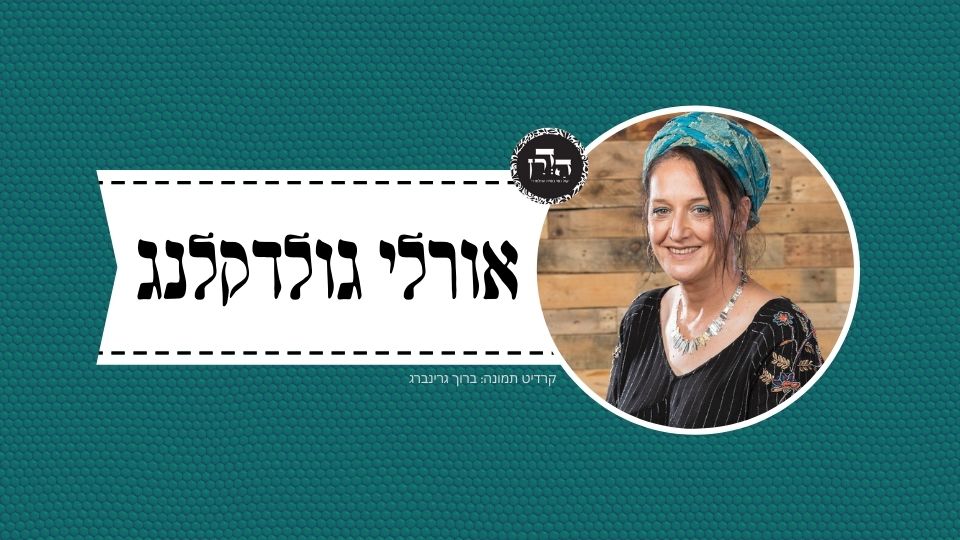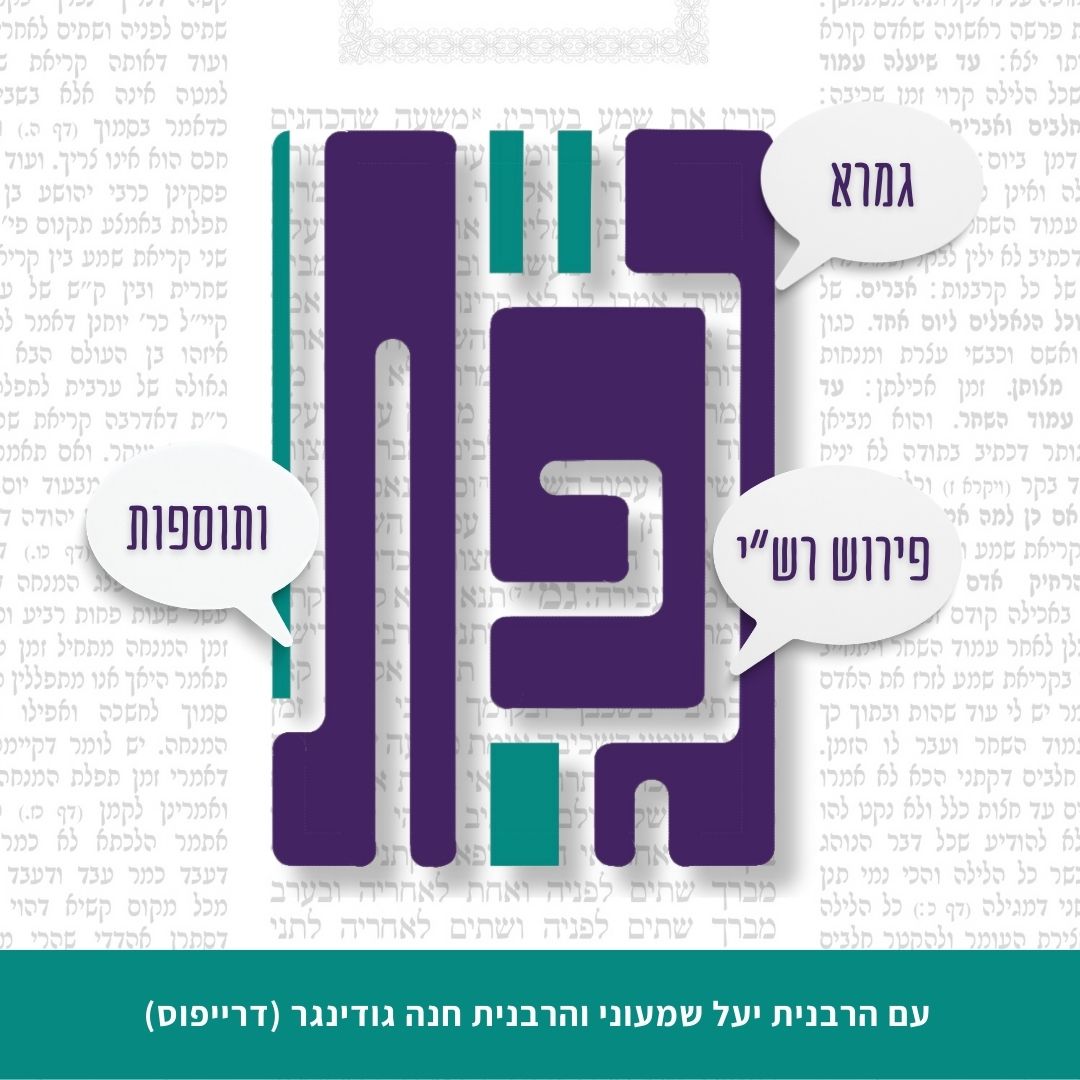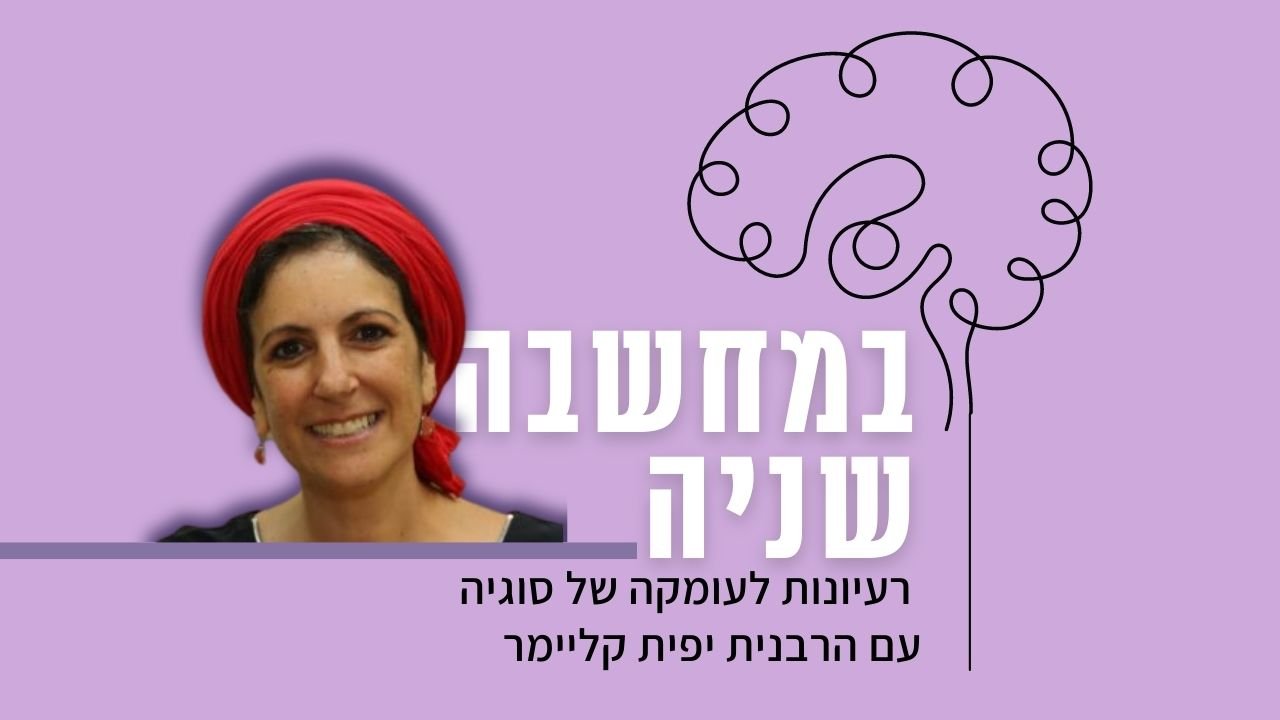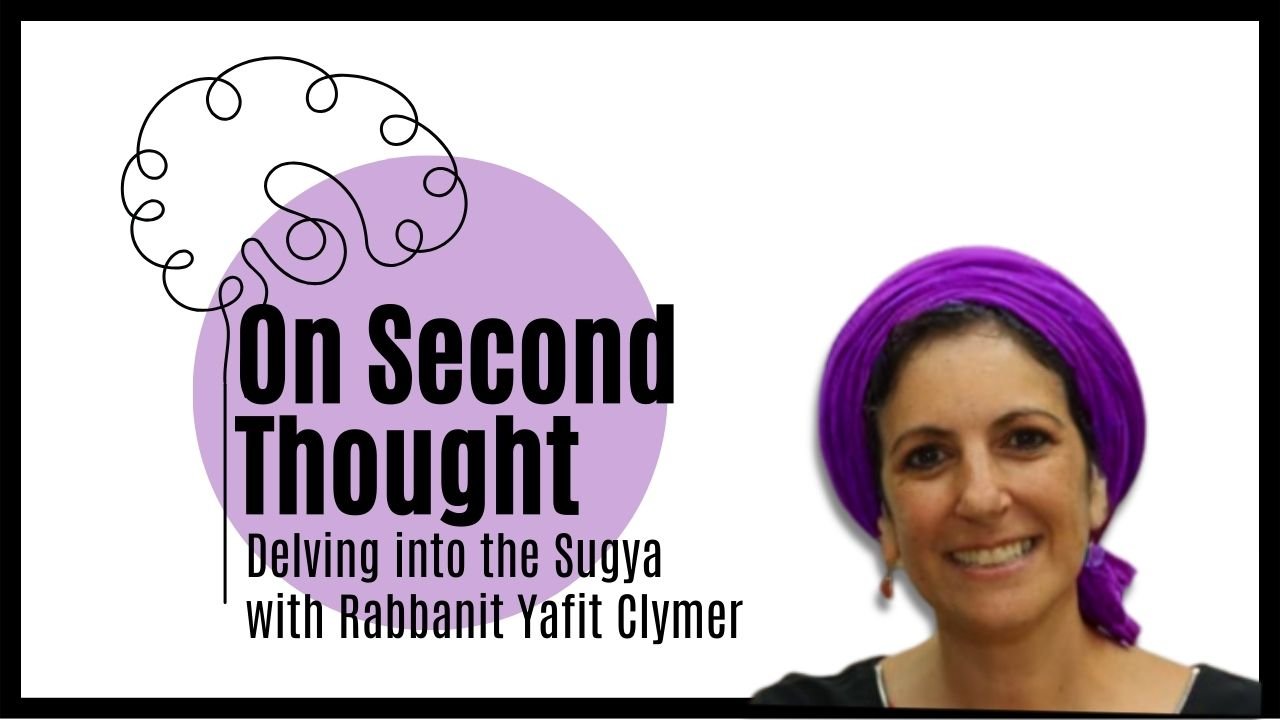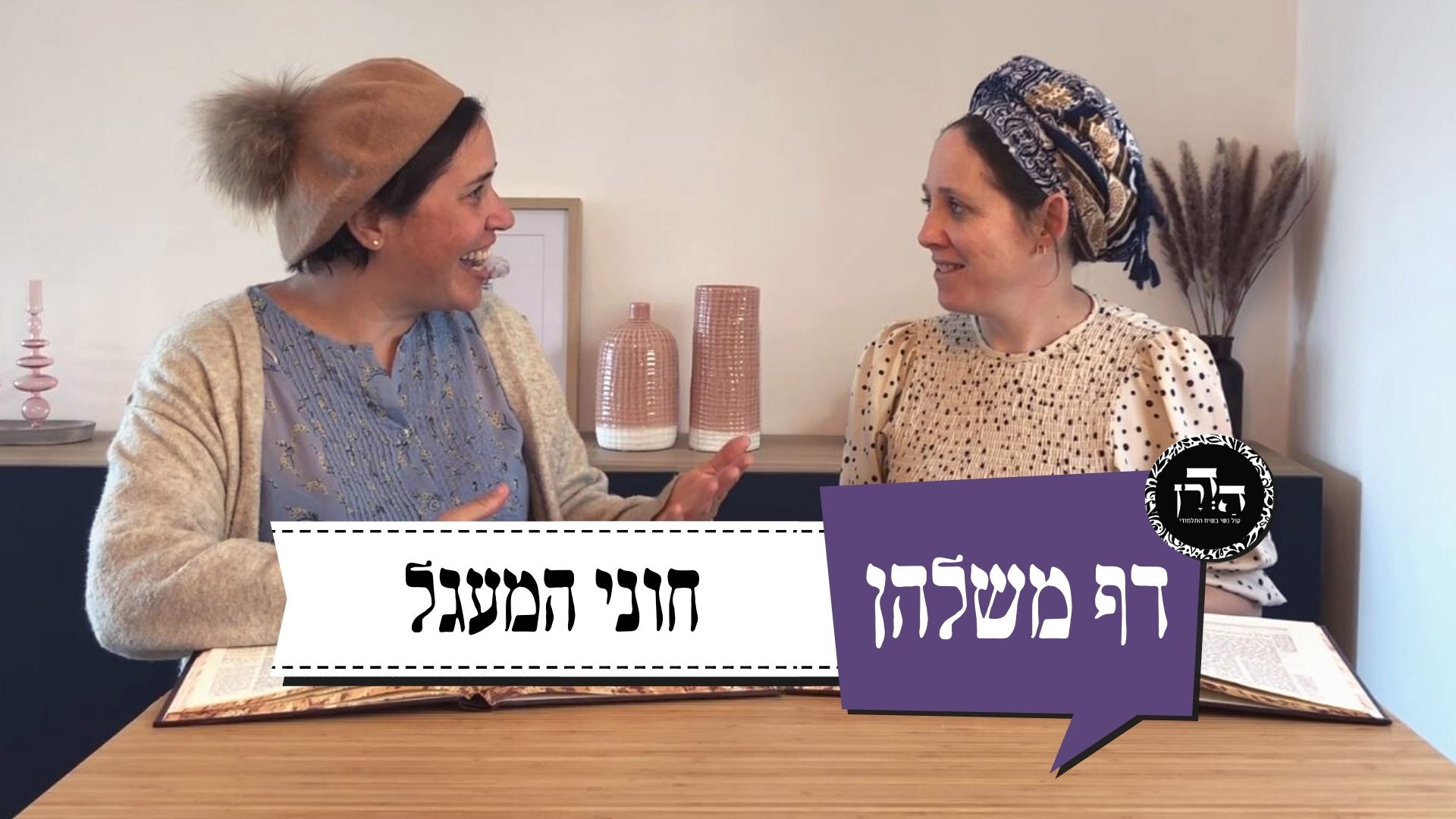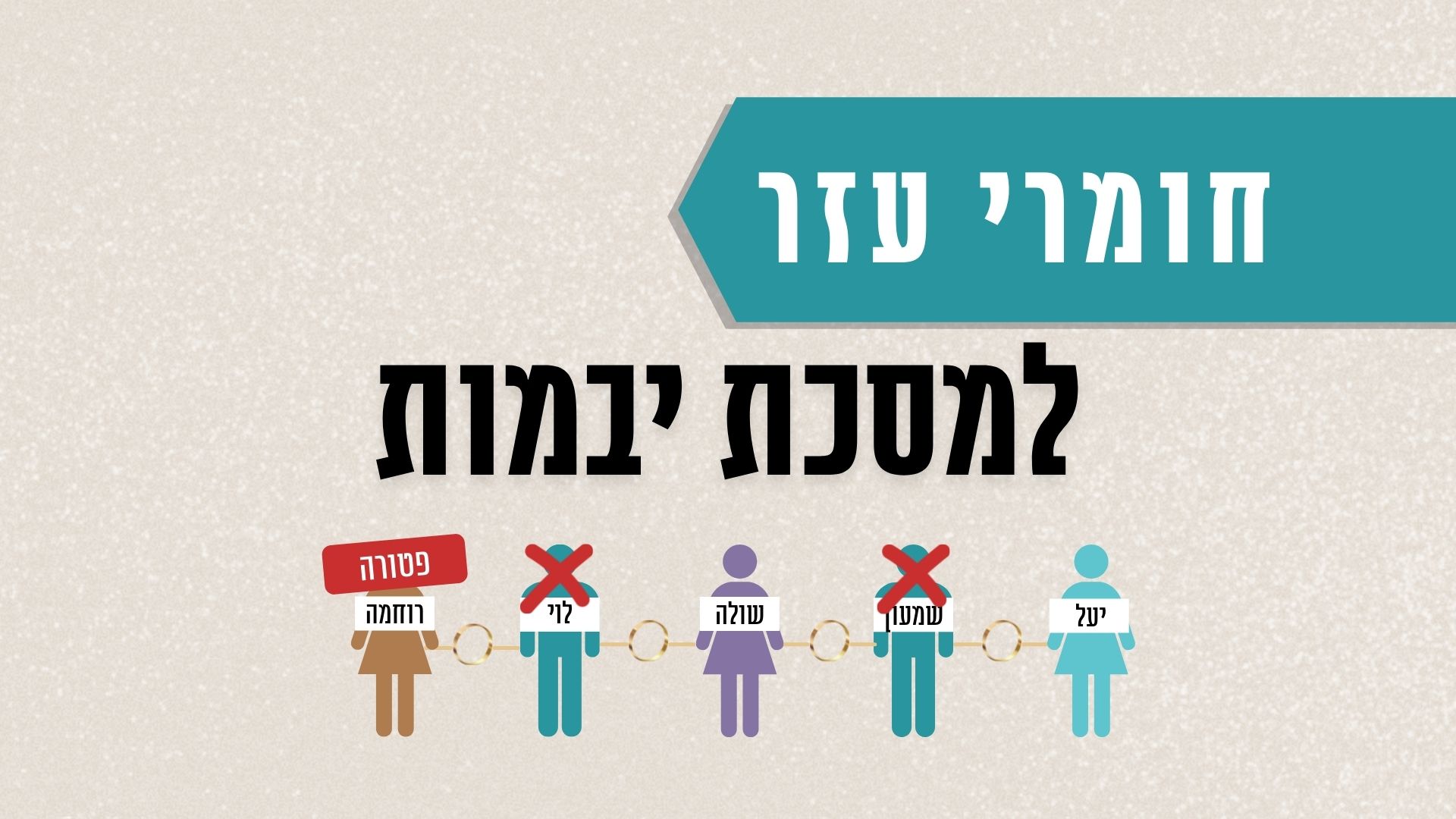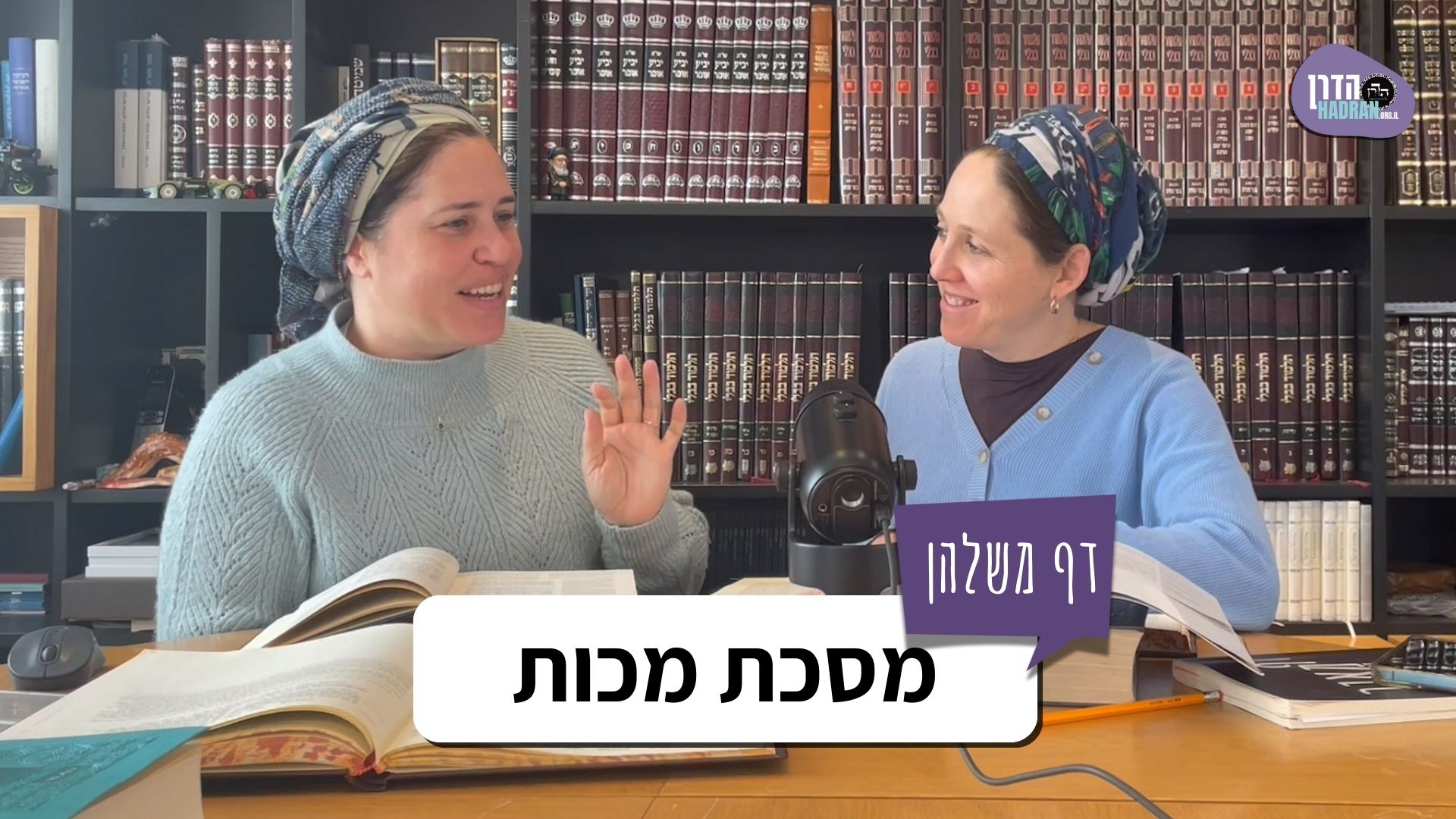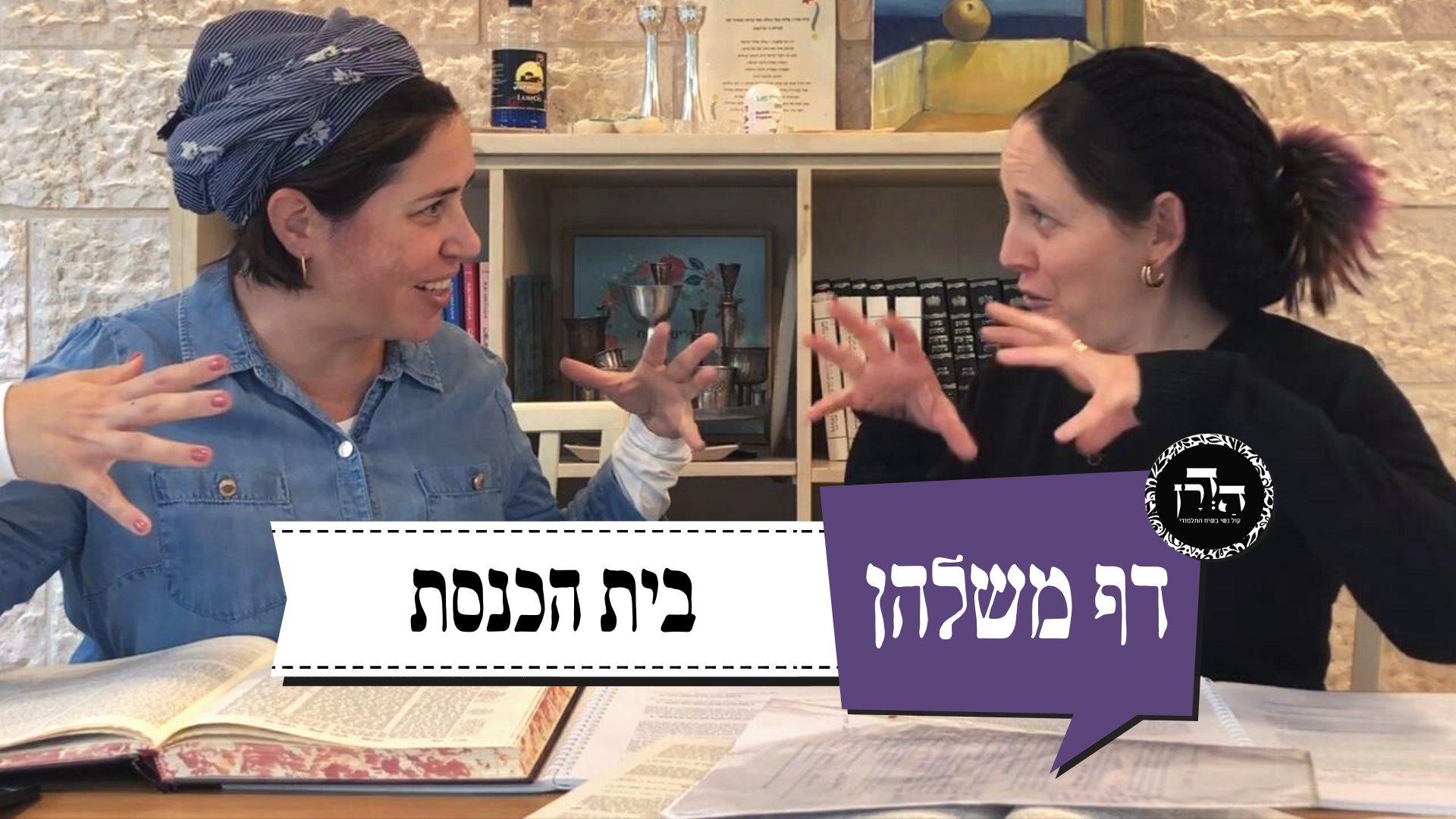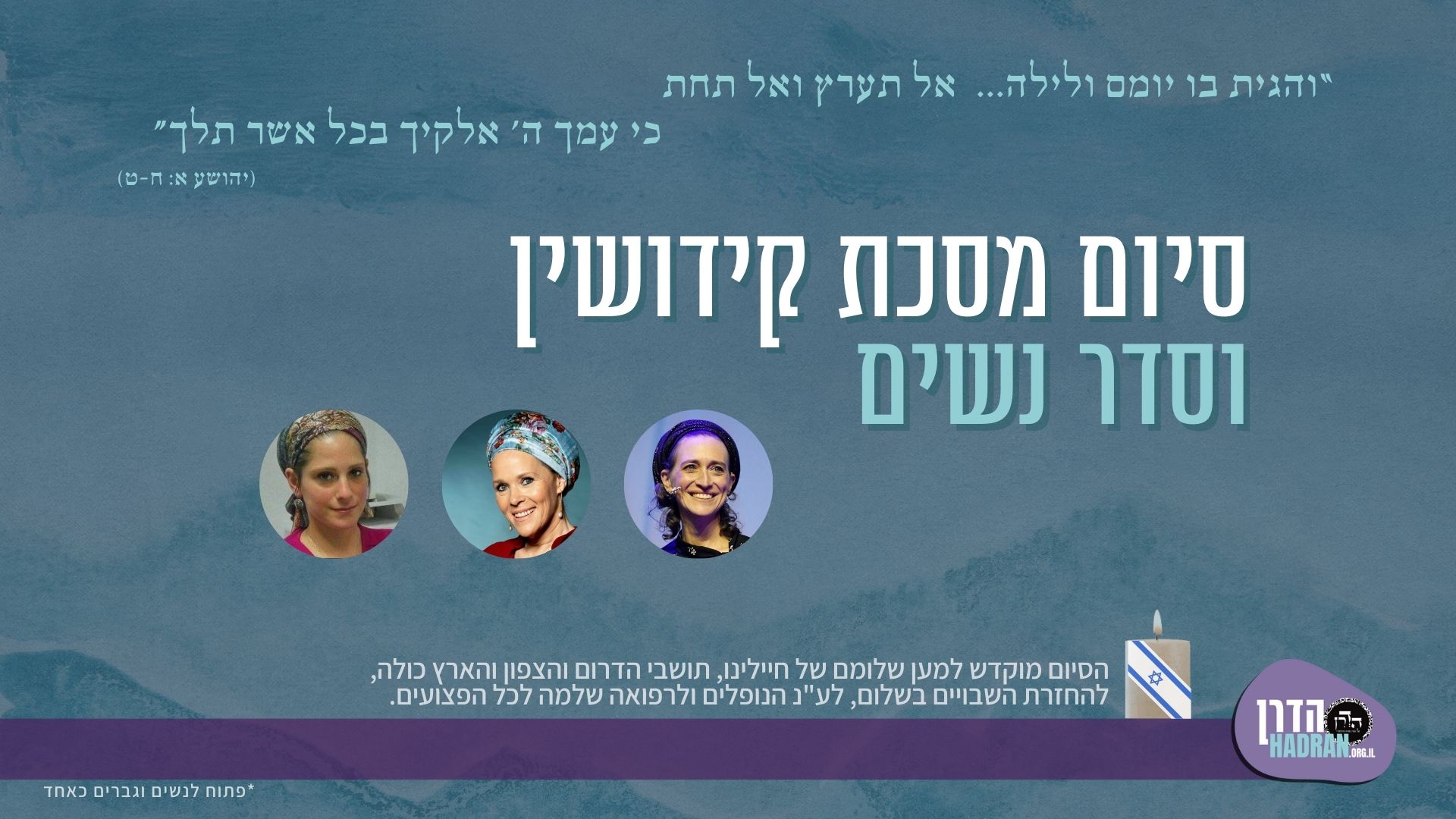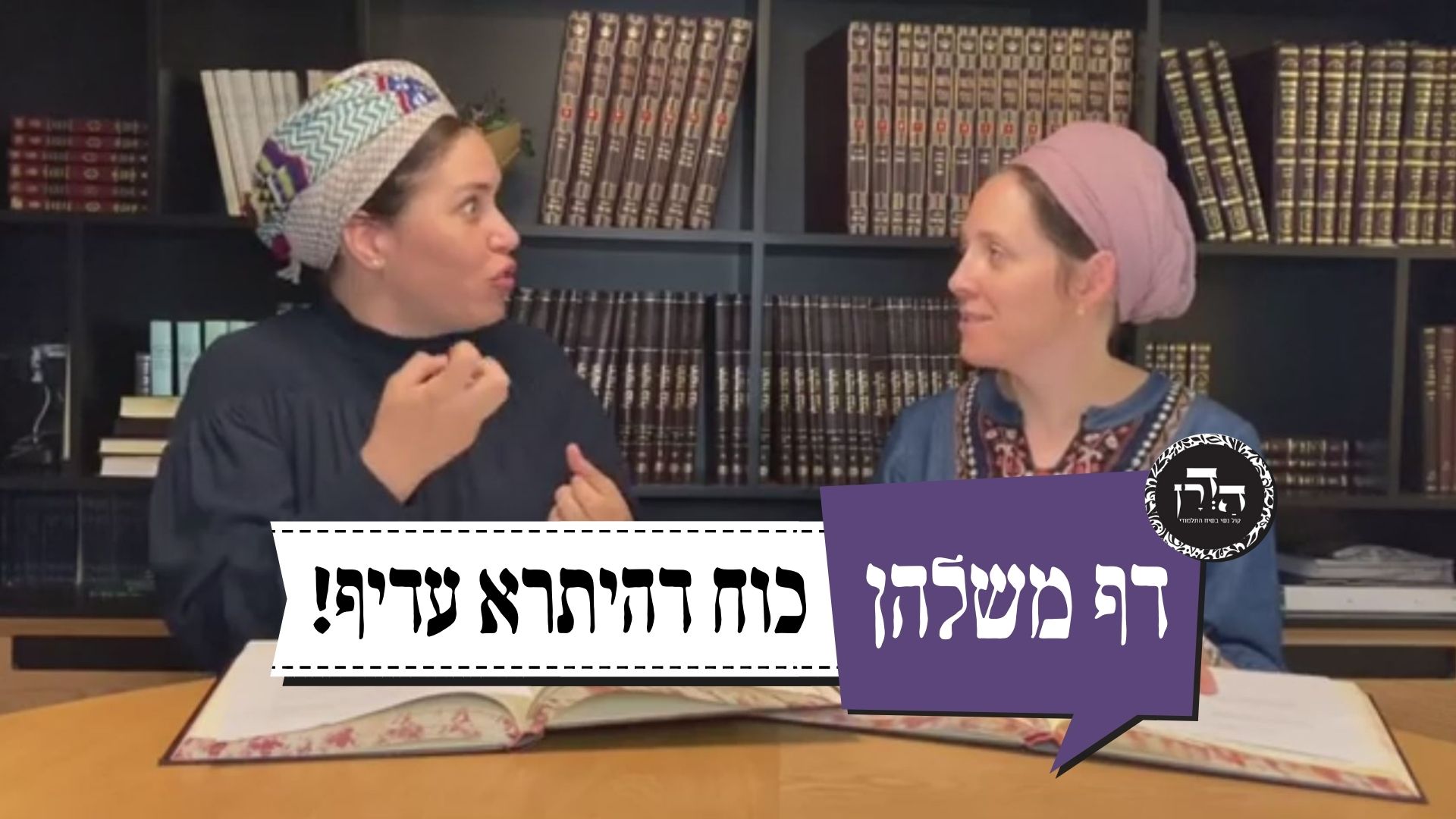האם אפשר לאכול מבשר שנשחט על ידי יהודי שידוע שעובד אלילים?
הלימוד השבוע מוקדש לזכות ולשלום הַיְימׇנוֹט אֱמוּנָה בַּת באנצ’י (קָסָאוּ) בת 11 שנעלמה במקום מגוריה בצפת, לפני שנתיים, ביום ט”ז אדר תשפ”ד (25.2.24), ולא נודעו עקבותיה.
הלימוד השבוע מוקדש למען ביטחון המדינה, החיילים והאזרחים, ולמען חירותו של העם האיראני. שנזכה בקרוב שיתקיים בנו הפסוק: "לַיְּהוּדִים הָיְתָה אוֹרָה וְשִׂמְחָה וְשָׂשֹׂן וִיקָר”.
הלימוד השבוע מוקדש לזכות וְלִשְׁלוֹם הָיימָנוֹט אֱמוּנָה בַּת באנצ’י (קָסָאוּ), בת 11 שנעלמה במקום מגוריה בצפת, לפני שנתיים, ביום ט”ז אדר תשפ״ד (25.2.24), ולא נודעו עקבותיה. אנו מתפללים שֶׁתִּמָּצֵא וְתוּשַׁב לביתה במהרה!
רוצה להקדיש שיעור?

כלים
הלימוד השבוע מוקדש לזכות ולשלום הַיְימׇנוֹט אֱמוּנָה בַּת באנצ’י (קָסָאוּ) בת 11 שנעלמה במקום מגוריה בצפת, לפני שנתיים, ביום ט”ז אדר תשפ”ד (25.2.24), ולא נודעו עקבותיה.
הלימוד השבוע מוקדש למען ביטחון המדינה, החיילים והאזרחים, ולמען חירותו של העם האיראני. שנזכה בקרוב שיתקיים בנו הפסוק: "לַיְּהוּדִים הָיְתָה אוֹרָה וְשִׂמְחָה וְשָׂשֹׂן וִיקָר”.
הלימוד השבוע מוקדש לזכות וְלִשְׁלוֹם הָיימָנוֹט אֱמוּנָה בַּת באנצ’י (קָסָאוּ), בת 11 שנעלמה במקום מגוריה בצפת, לפני שנתיים, ביום ט”ז אדר תשפ״ד (25.2.24), ולא נודעו עקבותיה. אנו מתפללים שֶׁתִּמָּצֵא וְתוּשַׁב לביתה במהרה!
כלים
העמקה
רוצה להבין מה באמת קורה מתחת לפני השטח של הסוגיה?
שיעורים, פודקאסטים והרחבות של מיטב המורות שלנו יפתחו לך עוד זוויות וכיווני חשיבה.
חדשה בלימוד הגמרא?
זה הדף הראשון שלך? איזו התרגשות עצומה! יש לנו בדיוק את התכנים והכלים שיעזרו לך לעשות את הצעדים הראשונים ללמידה בקצב וברמה שלך, כך תוכלי להרגיש בנוח גם בתוך הסוגיות המורכבות ומאתגרות.
פסיפס הלומדות שלנו
גלי את קהילת הלומדות שלנו, מגוון נשים, רקעים וסיפורים. כולן חלק מתנועה ומסע מרגש ועוצמתי.
חולין ה
לא הוה מפליג נפשיה מיניה מנלן אילימא מדכתיב (מלכים א כב, ד) כמוני כמוך כעמי כעמך אלא מעתה כסוסי כסוסיך הכי נמי אלא מה דהוי אסוסיך תהוי אסוסי ה”נ מאי דהוי עלך ועילוי עמך תיהוי עלי ועילוי עמי
The Gemara rejects that suggestion: Jehoshaphat would not have separated himself from Ahab to eat and drink by himself, as he relied on him completely. From where do we derive this? If we say that it is derived from that which is written that Jehoshaphat said to Ahab: “I am as you are, my people as your people” (I Kings 22:4), i.e., I am equally reliable, this is difficult, as, if that is so, then when Jehoshaphat said at the conclusion of that verse: “My horses as your horses,” can this also be referring to reliability? Rather, Jehoshaphat’s intention was: That which will befall your horses will befall my horses; so too, that which will befall you and your people will befall me and my people.
אלא מהכא (מלכים א כב, י) ומלך ישראל ויהושפט מלך יהודה יושבים איש על כסאו מלובשים בגדים בגורן פתח שער שומרון מאי גורן אילימא גורן ממש אטו שער שומרון גורן הוה אלא כי גורן דתנן סנהדרין היתה כחצי גורן עגולה כדי שיהו רואין זה את זה
Rather, it is derived that Jehoshaphat relied upon Ahab from here: “And the king of Israel and Jehoshaphat, king of Judea, sat each on his throne, arrayed in their robes, in a threshing floor, at the entrance of the gate of Samaria” (I Kings 22:10). The Gemara asks: What is the meaning of the term threshing floor in this context? If we say that it was an actual threshing floor; is that to say that the gate of Samaria was a threshing floor? Typically, the gate of a city was the place of assembly for the city’s judges and elders, not a threshing floor. Rather, they were sitting in a configuration like that of a circular threshing floor, i.e., facing each other in a display of amity, as we learned in a mishna (Sanhedrin 36b): A Sanhedrin was arranged in the same layout as half of a circular threshing floor, so that the judges would see each other. This verse demonstrates that Jehoshaphat deliberated with Ahab and relied on his judgment.
לימא מסייע ליה (מלכים א יז, ו) והעורבים מביאים לו לחם ובשר בבקר ולחם ובשר בערב ואמר רב יהודה אמר רב מבי טבחי דאחאב על פי הדבור שאני
The Gemara suggests: Let us say that the verse written with regard to Elijah supports the opinion of Rav Anan. The verse states: “And the ravens [orevim] brought him bread and meat in the morning, and bread and meat in the evening” (I Kings 17:6); and Rav Yehuda said that Rav said: They would bring the meat from the slaughterhouse of Ahab. Clearly, Elijah would not have eaten the meat if Ahab’s slaughter was not valid. The Gemara responds: Since he ate the meat according to the word of God, the case of Elijah is different, and no proof may be cited from there.
מאי עורבים אמר רבינא עורבים ממש א”ל רב אדא בר מניומי ודלמא תרי גברי דהוי שמייהו עורבים מי לא כתיב (שופטים ז, כה) ויהרגו את עורב בצור עורב ואת זאב וגו’ א”ל איתרמאי מילתא דתרוייהו הוה שמייהו עורבים
The Gemara asks: What is the meaning of orevim in this context? Ravina said: They were actual ravens. Rav Adda bar Minyumi said to him: And perhaps they were two men whose names were Oreb? Isn’t it written: “And they slew Oreb at the Rock of Oreb, and Zeeb they slew at the winepress of Zeeb” (Judges 7:25), indicating that Oreb is a person’s name? Ravina said to him: Did the matter just so happen that the names of both of the people supplying Elijah with food were Oreb? The improbability of this occurrence indicates that they were actual ravens.
ודלמא על שם מקומן מי לא כתיב (מלכים ב ה, ב) וארם יצאו גדודים וישבו מארץ ישראל נערה קטנה וקשיא לן קרי לה נערה וקרי לה קטנה וא”ר פדת קטנה דמן נעורן אם כן עורביים מיבעי ליה
The Gemara suggests: And perhaps they are called orevim after the name of their place of origin. Isn’t it written: “And the Arameans had gone out in bands, and had brought away captive out of the land of Israel a minor young woman [na’ara ketana]” (II Kings 5:2)? And it is difficult for us to understand why the verse calls her a young woman and also calls her a minor, which are two different stages in a girl’s development. And Rabbi Pedat said: She was a minor girl who was from a place called Naaran. Perhaps in the case of Elijah they were two people from a place called Oreb. The Gemara rejects that suggestion: If so, Orebites [oreviyyim] should have been written in the verse.
לימא מסייע ליה הכל שוחטין ואפילו כותי ואפילו ערל ואפילו ישראל מומר האי ערל ה”ד אילימא שמתו אחיו מחמת מילה האי ישראל מעליא הוא אלא פשיטא מומר לערלות
§ Let us say that the following baraita supports the opinion of Rav Anan, who says that it is permitted to eat from the slaughter of a Jew who is a transgressor with regard to idol worship: Everyone slaughters, and even a Samaritan, and even an uncircumcised man, and even a Jewish transgressor. The Gemara analyzes the baraita: This uncircumcised man, what are the circumstances? If we say that he is an uncircumcised man whose brothers died due to circumcision and the concern is that he might suffer a similar fate, clearly one may eat from what he slaughters, as he is a full-fledged Jew and not a transgressor at all. Rather, it is obvious that he is a transgressor with regard to remaining uncircumcised, as he refuses to be circumcised.
אימא סיפא ואפילו ישראל מומר ה”ד אי מומר לדבר אחד היינו מומר לערלות אלא לאו מומר לעבודת כוכבים וכדרב ענן
Say the latter clause of the baraita: And even a Jewish transgressor. What are the circumstances? If he is a transgressor with regard to one matter, that is identical to the case of a transgressor with regard to remaining uncircumcised. Rather, is it not that he is a transgressor with regard to idol worship, and it is in accordance with the opinion of Rav Anan?
לא לעולם אימא לך מומר לעבודת כוכבים לא דאמר מר חמורה עבודת כוכבים שכל הכופר בה כמודה בכל התורה כולה
The Gemara rejects that proof: No, actually I will say to you that a transgressor with regard to idol worship may not slaughter, as the Master said: Idol worship is a severe transgression, as with regard to anyone who denies it, it is as though he acknowledges his acceptance of the entire Torah. Conversely, with regard to one who accepts idolatry, it is as though he denies the entire Torah. Therefore, his halakhic status is that of a transgressor with regard to the entire Torah, and his slaughter is not valid.
אלא מומר לאותו דבר וכדרבא
Rather, the transgressor in the latter clause of the baraita is a transgressor concerning the same matter of eating unslaughtered carcasses, and it is in accordance with the opinion of Rava, who said that one may rely on the slaughter of a transgressor with regard to eating unslaughtered animal carcasses to satisfy his appetite even ab initio.
מיתיבי (ויקרא א, ב) מכם ולא כולכם להוציא את המומר מכם בכם חלקתי ולא באומות מן הבהמה להביא בני אדם שדומים לבהמה מכאן אמרו מקבלין קרבנות מפושעי ישראל כדי שיחזרו בהן בתשובה חוץ מן המומר ומנסך את היין ומחלל שבתות בפרהסיא
The Gemara raises an objection to the opinion of Rav Anan from that which is taught in a baraita with regard to the verse: “When any man of you brings an offering unto the Lord, from the animal” (Leviticus 1:2). The tanna infers: “Of you,” indicating: But not all of you. This serves to exclude the transgressor, from whom an offering is not accepted. The tanna continues: The term “of you” is also interpreted to mean that I distinguished among you and not among the nations. Therefore, a gentile may bring an offering even if he is an idol worshipper. The expression “from the animal” serves to include people who are similar to an animal in that they do not recognize God. From here, the Sages stated: One accepts offerings from Jewish transgressors so that they will consequently repent, except for the transgressor, one who pours wine as a libation to idolatry, and one who desecrates Shabbat in public [befarhesya].
הא גופא קשיא אמרת מכם ולא כולכם להוציא את המומר והדר תני מקבלין קרבנות מפושעי ישראל
This baraita itself is difficult. Initially, you said: “Of you,” indicating: But not all of you. This serves to exclude the transgressor, from whom an offering is not accepted. And then the tanna teaches: One accepts offerings from Jewish transgressors.
הא לא קשיא רישא מומר לכל התורה כולה מציעתא מומר לדבר אחד
The Gemara answers: This is not difficult. The first clause states that an offering is not accepted from a transgressor with regard to the entire Torah. The middle clause states that one accepts an offering from a transgressor with regard to one matter.
אימא סיפא חוץ מן המומר ומנסך את היין ומחלל שבת בפרהסיא האי מומר היכי דמי אי מומר לכל התורה כולה היינו רישא ואי מומר לדבר אחד קשיא מציעתא
The Gemara challenges: Say the last clause: Except for the transgressor, and one who pours wine as a libation to idolatry, and one who desecrates Shabbat in public. With regard to this transgressor in the last clause, what are the circumstances? If the reference is to a transgressor with regard to the entire Torah, that is identical to the first clause: Of you, and not all of you, to exclude the transgressor. And if the reference is to a transgressor with regard to one matter, the middle clause is difficult, as it is stated there that one accepts an offering from a transgressor with regard to one matter.
אלא לאו הכי קאמר חוץ מן המומר לנסך את היין ולחלל שבתות בפרהסיא אלמא מומר לעבודת כוכבים הוה מומר לכל התורה כולה ותיובתא דרב ענן תיובתא
Rather, is it not that this is what the mishna is saying in the last clause: Except for the transgressor to pour wine as a libation to idolatry or to desecrate Shabbat in public? Apparently, a transgressor with regard to idol worship is a transgressor with regard to the entire Torah, and this baraita is a refutation of the opinion of Rav Anan. The Gemara concludes: It is indeed a conclusive refutation.
והא מהכא נפקא מהתם נפקא
The Gemara asks: And is this halakha that one does not accept an offering from a transgressor derived from the verse cited here? It is derived from the verse written there with regard to a sin offering:
(ויקרא ד, כז) מעם הארץ פרט למומר
“And if any one of the common people sins unwittingly…and he shall bring his offering” (Leviticus 4:27–28), from which it is inferred in a baraita: “Of the common people,” indicating: But not all of the common people. This serves to exclude a transgressor, from whom a sin offering is not accepted.
ר”ש בן יוסי אומר משום ר”ש (ויקרא ד, כב) אשר לא תעשינה בשגגה ואשם השב מידיעתו מביא קרבן על שגגתו אינו שב מידיעתו אינו מביא קרבן על שגגתו
Rabbi Shimon ben Yosei says in the name of Rabbi Shimon that the verse states: “And does unwittingly one of the things…that may not be done, and he becomes guilty, or if his sin that he sinned became known to him” (Leviticus 4:22–23). From the words “become known to him” it is inferred: One who repents due to his awareness that he performed a transgression, as had he known that the action is prohibited he would not have performed it, brings an offering for his unwitting transgression in order to achieve atonement. But one who does not repent due to his awareness that he sinned, e.g., a transgressor who would have sinned even had he been aware that the act is prohibited, does not bring an offering for his unwitting action.
ואמרינן מאי בינייהו ואמר רב המנונא מומר לאכול חלב והביא קרבן על הדם איכא בינייהו
And we say: What is the difference between their two opinions? And Rav Hamnuna said: The difference is in the case of a transgressor with regard to eating the forbidden fat of a domesticated animal and he brought an offering for unwittingly consuming blood is the difference between them. According to the first tanna he may not bring an offering, as he is a transgressor. According to Rabbi Shimon, since he repented for unwittingly consuming blood, due to his awareness that he sinned, he brings a sin offering for that unwitting sin. In any event, this baraita apparently contradicts the previously cited baraita with regard to the source for the halakha that one does not accept an offering from a transgressor.
חדא בחטאת וחדא בעולה וצריכי דאי אשמעינן חטאת משום דלכפרה הוא אבל עולה דדורון הוא אימא לקבל מיניה ואי אשמעינן עולה משום דלאו חיובא הוא אבל חטאת דחיובא הוא אימא לקבל מיניה צריכא
The Gemara answers: One source teaches with regard to the sin offering of a transgressor that it is not accepted, and one source teaches with regard to the burnt offering of a transgressor that it is not accepted. And both sources are necessary, as, if the Torah had taught us this halakha only with regard to a sin offering, one might have thought that it is not accepted due to the fact that it is for atonement, and as a transgressor he is undeserving of atonement, but with regard to a burnt offering, which is merely a gift [dedoron], say that one ought to accept it from him. And if the Torah had taught us this halakha only with regard to a burnt offering, one might have thought that it is not accepted due to the fact that it is not an obligation, but with regard to a sin offering, which is an obligation, say that one ought to accept it from him. Therefore, both sources are necessary.
וכל היכא דכתיב בהמה גריעותא היא והכתיב (תהלים לו, ז) אדם ובהמה תושיע ה’ ואמר רב יהודה אמר רב אלו בני אדם שהן ערומין בדעת ומשימין עצמן כבהמה התם כתיב אדם ובהמה הכא בהמה לחודיה כתיב
§ In the previous baraita the Sages derived from the phrase “from the animal” that people who are similar to an animal are included among those from whom offerings are accepted. The Gemara seeks to understand the meaning of the phrase: Similar to an animal, and asks: And everywhere that the word animal is written and interpreted as referring to a person, does it indicate a deficiency? But isn’t it written: “Man and animal You preserve, Lord” (Psalms 36:7), and Rav Yehuda says that Rav says: These are people who are clever in terms of their intellect, like people, and despite their intelligence they comport themselves humbly and self-effacingly, like an animal. The Gemara answers: There it is written “man and animal.” Here, the word “animal” alone is written.
וכל היכא דכתיב אדם ובהמה מעליותא היא והא כתיב (ירמיהו לא, כז) וזרעתי את בית ישראל זרע אדם וזרע בהמה התם הא חלקיה קרא זרע אדם לחוד וזרע בהמה לחוד
The Gemara asks: And everywhere that the terms “man” and “animal” are written together, does it indicate a virtue? But isn’t it written: “And I will sow the house of Israel and the house of Judah with the seed of man and with the seed of animal” (Jeremiah 31:26), and the Sages interpreted the phrase “seed of animal” as a reference to ignorant, inferior people. The Gemara answers: There, doesn’t the verse separate man and animal? The seed of man is discrete and the seed of animal is discrete.
(סימן נקלף)
§ The Gemara revisits the matter of slaughter by a Samaritan and cites a mnemonic for the names of the Sages that follow: Nun, for Ḥanan; kuf, for Ya’akov; lamed, for ben Levi; and peh, for bar Kappara.
א”ר חנן א”ר יעקב בר אידי א”ר יהושע בן לוי משום בר קפרא ר”ג ובית דינו נמנו על שחיטת כותי ואסרוה א”ל רבי זירא לרבי יעקב בר אידי שמא לא שמע רבי אלא בשאין ישראל עומד על גביו א”ל דמי האי מרבנן כדלא גמירי אינשי שמעתא בשאין ישראל עומד על גביו למימרא בעי
§ Rabbi Ḥanan says that Rabbi Ya’akov bar Idi says that Rabbi Yehoshua ben Levi says in the name of bar Kappara: The opinions of Rabban Gamliel and his court were counted with regard to the status of the slaughter of a Samaritan, and they prohibited it. Rabbi Zeira said to Rabbi Ya’akov bar Idi: Perhaps my teacher heard that halakha only in a case where a Jew is not standing over him. Rabbi Ya’akov bar Idi said to Rabbi Zeira: This one of the Sages seems like one of the people who have not studied halakha. When a Jew is not standing over the Samaritan is it necessary to say that it is prohibited to eat from what he slaughters?
קבלה מיניה או לא קבלה מיניה ת”ש דאמר ר”נ בר יצחק א”ר אסי אני ראיתי את רבי יוחנן שאכל משחיטת כותי אף רבי אסי אכל משחיטת כותי ותהי בה רבי זירא לא שמיעא להו דאי הוה שמיעא להו הוו מקבלי לה או דלמא שמיע להו ולא קבלוה
The Gemara asks: Did Rabbi Zeira accept that response from Rabbi Ya’akov bar Idi or did he not accept it from him? Come and hear a proof to resolve that dilemma from that which Rav Naḥman bar Yitzḥak says that Rabbi Asi says: I saw that Rabbi Yoḥanan ate from the slaughter of a Samaritan. And Rabbi Asi too ate from the slaughter of a Samaritan. And Rabbi Zeira wondered about it, whether perhaps they did not hear the halakha that it is prohibited to eat from the slaughter of a Samaritan but had they heard it they would have accepted it, or perhaps they heard the halakha but did not accept it.
הדר פשיט לנפשיה מסתברא דשמיע להו ולא קבלוה דאי ס”ד לא שמיע להו ואי הוה שמיע להו הוו מקבלי לה היכי מסתייעא מילתא למיכל איסורא השתא בהמתן של צדיקים אין הקב”ה מביא תקלה על ידן צדיקים עצמן לא כל שכן
Rabbi Zeira then resolved the matter for himself. It stands to reason that they heard it and did not accept it. As, if it enters your mind that they did not hear it, but that had they heard it they would have accepted it, how did the matter eventuate, leading these Sages to eat forbidden food? Now consider: If even through the animals of the righteous, the Holy One, Blessed be He, does not generate mishaps, then is it not all the more so true that the righteous themselves would not experience mishaps?
